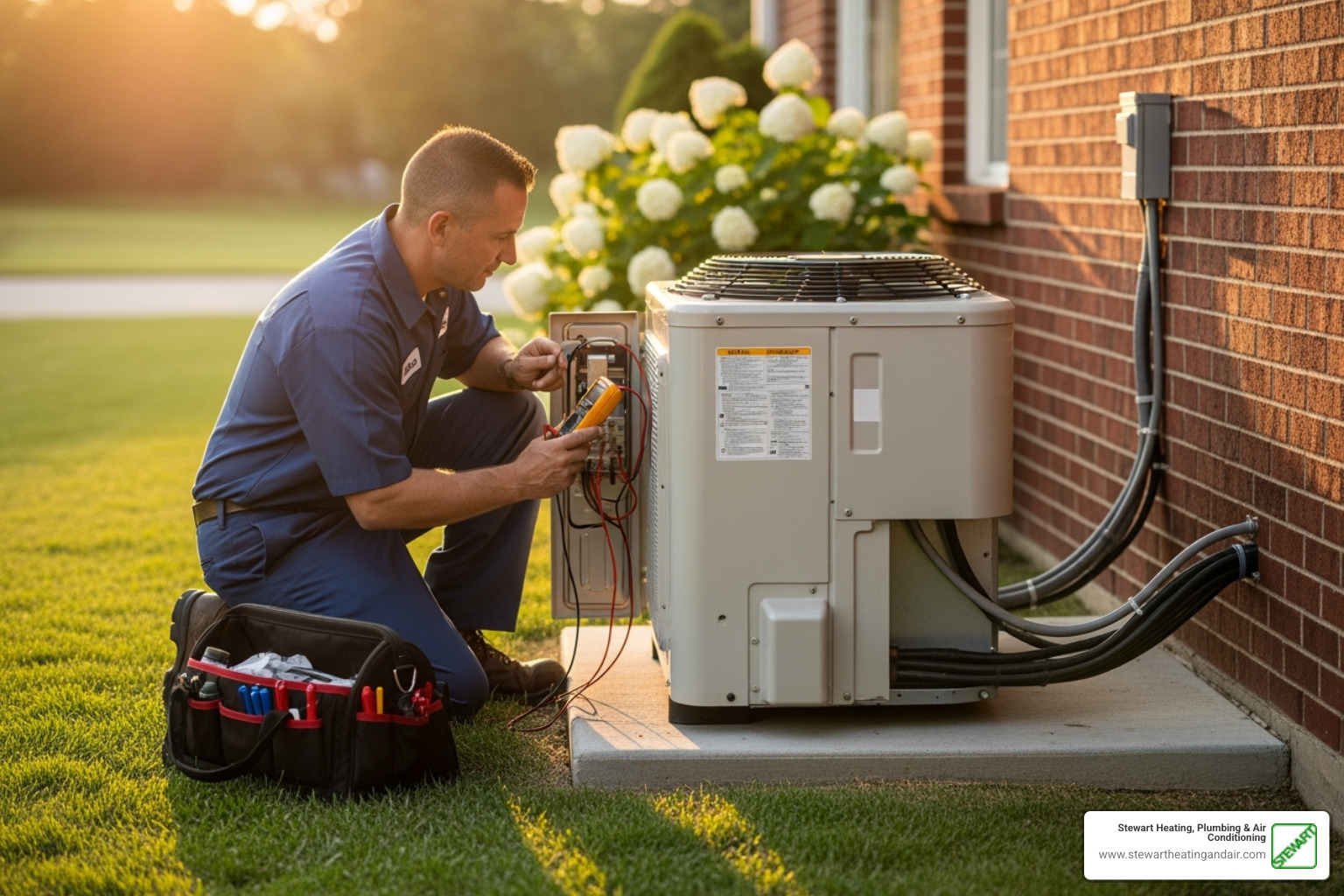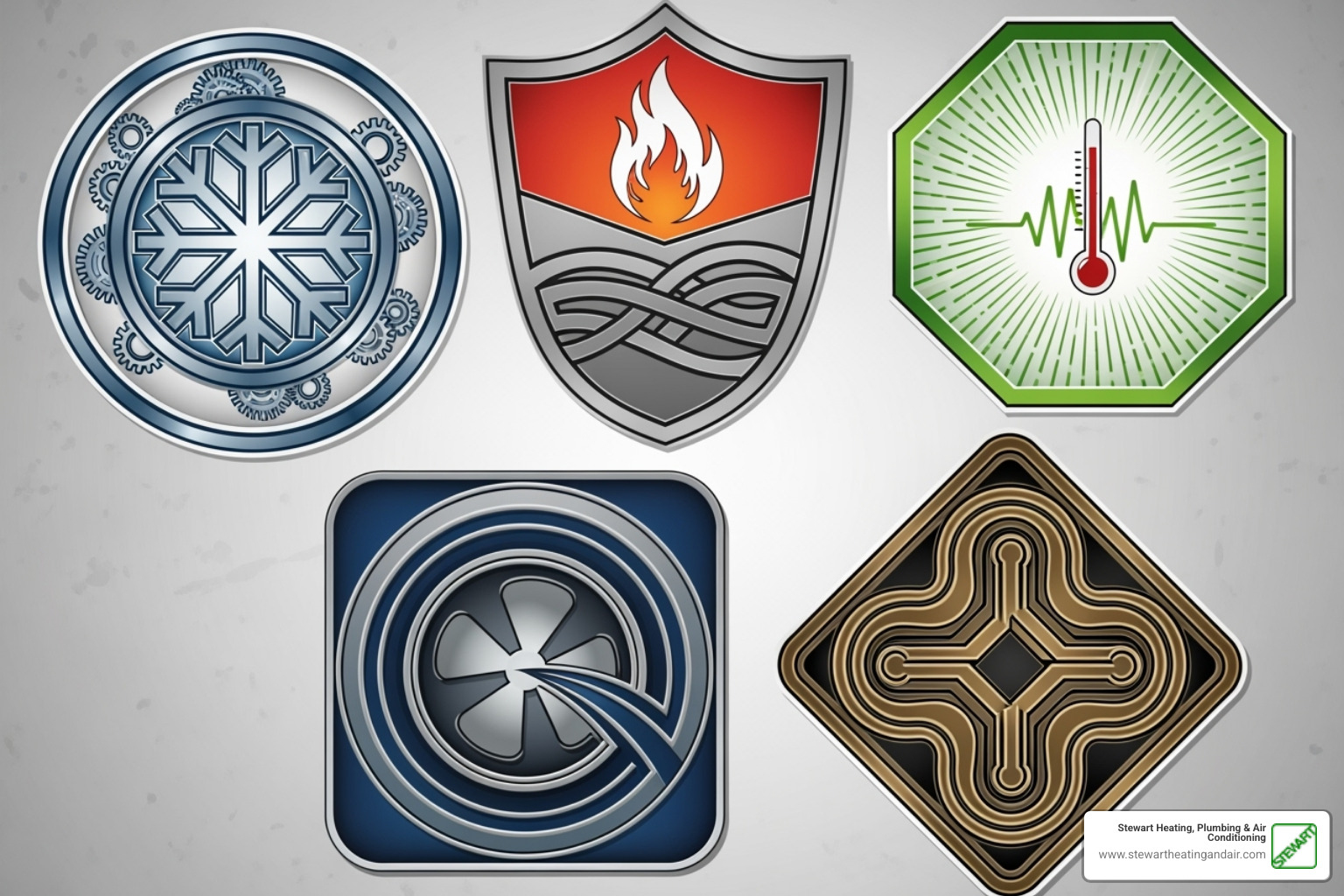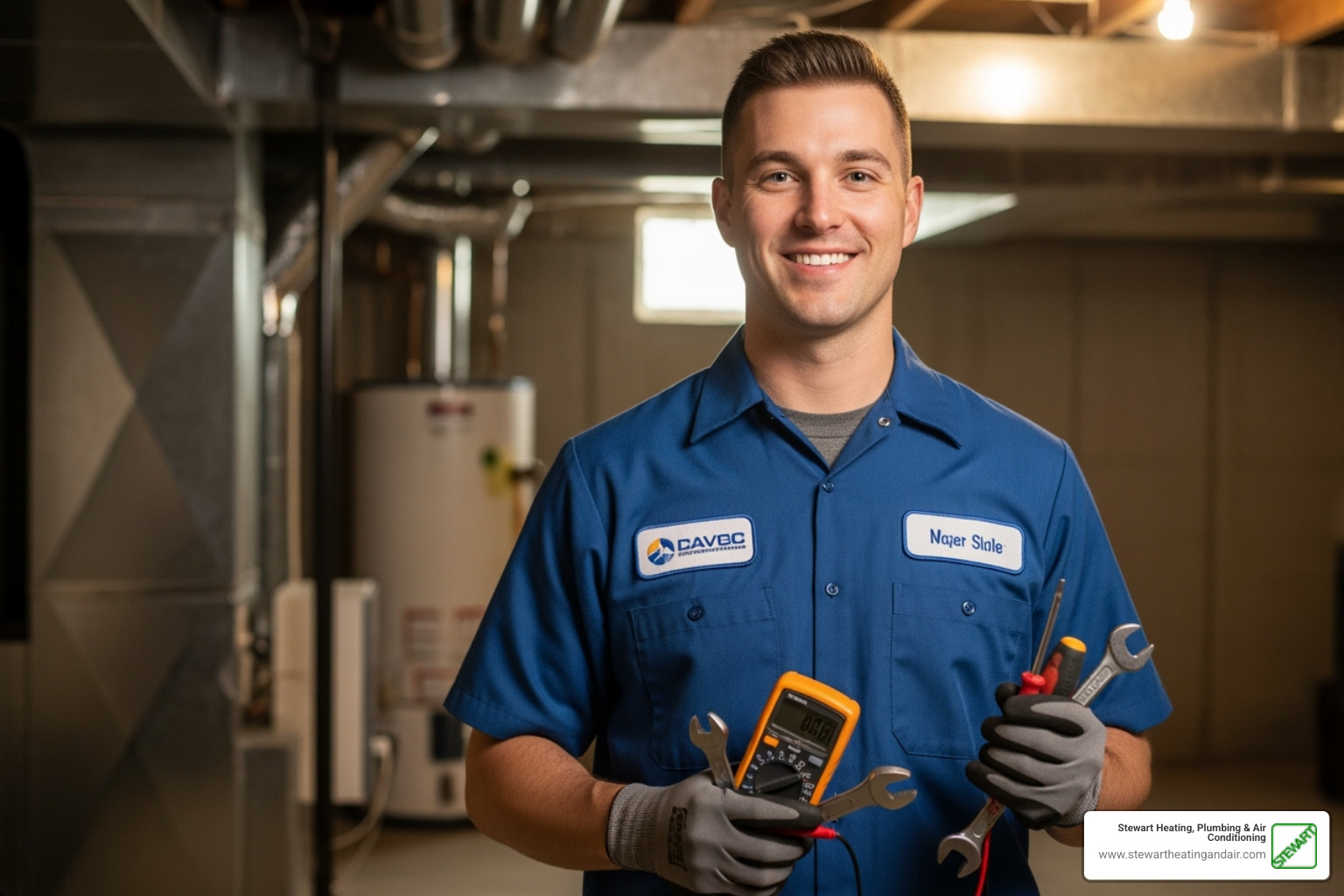
Why HVAC Certification Matters for Your Career and Home Comfort
A Certified HVAC technician is a professional who has completed specialized training and passed industry-recognized exams to install, maintain, and repair HVAC systems. They must hold key certifications like EPA 608 for refrigerant handling and often pursue advanced credentials from organizations like NATE (North American Technician Excellence).
Key requirements to become a certified HVAC technician:
- High school diploma or GED with a focus on math and science
- Complete an HVAC training program (6 months to 2 years)
- Pass the EPA 608 certification exam (mandatory for refrigerant work)
- Gain hands-on experience through an apprenticeship (3-5 years)
- Obtain additional certifications like NATE or HVAC Excellence
- Meet state licensing requirements (varies by location)
The HVAC industry is growing rapidly, with average salaries around $70,000 and experienced pros earning over $100,000. A significant shortage of skilled tradespeople means excellent job security and opportunities for advancement.
For aspiring technicians and homeowners alike, certification is the mark of a qualified professional. It ensures competence, safety, and reliability, helping you avoid costly breakdowns and ensuring your comfort systems are in good hands.

Why Become a Certified HVAC Technician?
Becoming a Certified HVAC technician is a smart career choice, offering job security, excellent pay, and the satisfaction of solving real-world problems. As a skilled trade, it provides stability in any economy. The top reason is job security; homes and businesses in places like Pittsburg and Contra Costa County will always need heating and cooling. With a significant shortage of skilled tradespeople, certified technicians are in high demand.
The high earning potential is another major draw. Experienced technicians can earn six-figure salaries, and your income grows with your skills. The HVAC industry also offers multiple paths for career advancement, from specializing in commercial systems to starting your own business.
Proper certification builds industry credibility and customer trust. At Stewart Heating, Plumbing & Air Conditioning, our customers rely on us because they know our certified technicians have the expertise to handle their systems safely and effectively. For those who enjoy hands-on work and problem-solving, HVAC offers new challenges daily. It's rewarding work that directly improves people's quality of life by restoring their comfort.
To learn more about the solutions our certified technicians provide, visit our HVAC Services page.
Foundational Education and Training
Your journey to becoming a Certified HVAC technician begins with a solid educational foundation. A high school diploma or GED is the typical starting point. Courses in math, physics, and electronics will give you a significant head start by teaching you the principles behind HVAC systems.
Next, enroll in a vocational or trade school program. These programs, which range from six months to two years, provide the theoretical knowledge and practical skills needed in the field. The curriculum covers refrigeration, electrical systems, safety protocols, and installation techniques. Hands-on lab work is a critical component, allowing you to work with real equipment and bridge the gap between theory and real-world application. This training prepares you for an immediate entry into the workforce and provides a base for lifelong learning in an evolving industry.
To see what a professional installation involves, you can schedule an HVAC installation estimate with our team.
The Value of an Apprenticeship
An apprenticeship is where your HVAC career truly begins, changing classroom knowledge into real-world expertise. There is no substitute for this hands-on experience.
On-the-job training is the core of an apprenticeship. You'll work alongside and learn from experienced Certified HVAC technicians who serve as mentors. They teach you the practical tricks of the trade that can't be learned from a textbook. A key benefit is earning while learning; you receive a paycheck while gaining invaluable skills, making it a financially viable career path.
A typical apprenticeship combines thousands of on-the-job hours with periodic classroom instruction, ensuring you can apply new concepts in a practical setting. This real-world experience is what sets apprenticeship graduates apart. By the time you complete your program, you'll have the skills and confidence to diagnose and fix a wide variety of HVAC issues.
The federal government recognizes the value of these programs. You can learn more at: Consider completing an apprenticeship program. An apprenticeship is your entry into a community of skilled professionals who take pride in their work.
Key HVAC Certifications Explained
Earning credentials as a Certified HVAC technician is what validates your expertise. Certifications are badges of honor that prove your specialized knowledge and skills. It's important to distinguish between licensing (legal permission to practice) and certification (proof of meeting industry standards). Both are crucial for professional credibility, which is why customers in Pittsburg and Contra Costa County trust certified professionals.

Understanding the key certifications will help you chart your course. Each one serves a specific purpose and demonstrates different aspects of your professional competence.
EPA 608 certification is the mandatory foundation for any technician working with refrigerants. NATE certification is the industry's gold standard for technical expertise. HVAC Excellence certification offers another respected pathway to demonstrate your skills.
Here's a comparison of the most important HVAC certifications:
| Certification Type | Purpose | Who It's For | What It Covers |
|---|---|---|---|
| EPA 608 | Legal requirement for refrigerant handling | All HVAC technicians | Refrigerant safety, recovery procedures, environmental protection, Clean Air Act compliance |
| NATE | Industry standard for technical competence | Experienced technicians seeking credibility | Core HVAC principles, installation, service, specialty areas like heat pumps or commercial systems |
| HVAC Excellence | Alternative pathway for demonstrating knowledge | Entry-level to experienced technicians | Comprehensive HVAC theory, practical applications, troubleshooting, system design |
At Stewart Heating, Plumbing & Air Conditioning, we hold certifications that demonstrate our commitment to excellence. Starting with the mandatory EPA 608 and adding industry credentials like NATE gives technicians a competitive edge and shows dedication to professional growth.
Mandatory EPA 608 Certification
EPA 608 certification is not optional. The EPA requires certification for technicians who handle refrigerants, making it the absolute foundation of an HVAC career. This requirement stems from the Clean Air Act and is designed to protect the ozone layer from harmful substances.
Proper refrigerant handling is the core of the certification. You'll learn how to safely recover, recycle, and prevent the release of refrigerants. The certification is divided into types based on equipment: Type I (small appliances), Type II (high-pressure systems like residential AC), and Type III (low-pressure systems). Many technicians pursue Universal Certification, which covers all three, increasing their versatility and value to employers.
Knowing your technician holds EPA 608 certification provides peace of mind that they are following federal regulations and protecting the environment, a commitment we take seriously for our customers in Antioch, Concord, and Walnut Creek.
Industry-Standard NATE Certification
While EPA 608 is a legal requirement, NATE certification is what distinguishes great technicians. North American Technician Excellence is the gold standard in our industry, signifying a true professional.
NATE certification is about demonstrating expertise in real-world HVAC scenarios. It shows you excel in your understanding of heating and cooling systems. The program tests core competencies and offers specialty exams in areas like air conditioning, heat pumps, or gas heating. This specialization makes you more attractive to employers seeking specific skills.
NATE certification covers both installation and service, ensuring you can perform work correctly and efficiently while possessing strong diagnostic skills. At Stewart Heating, Plumbing & Air Conditioning, We are a NATE Certified Contractor in Contra Costa County. This reflects our commitment to the highest quality service.
Pursuing NATE certification is an investment in your career. Employers and customers recognize the value of this credential, as it proves a technician has gone the extra mile to validate their skills through rigorous, comprehensive testing.
Introduction

When your AC fails on a hot Pittsburg, CA day or your heater quits in winter, you need an expert. A Certified HVAC technician brings proven skills, and the "certified" part makes all the difference.
A Certified HVAC technician is a skilled professional who has completed rigorous training and passed demanding industry exams to install, maintain, and repair heating, ventilation, and air conditioning systems. They must hold key credentials like the EPA 608 certification for safe refrigerant handling and often pursue further qualifications from organizations like NATE (North American Technician Excellence).
The path to certification involves a high school diploma or GED, followed by an HVAC training program (6 months to 2 years). Technicians must then pass the mandatory EPA 608 exam, gain hands-on experience in a 3-5 year apprenticeship, and meet state licensing requirements.
The HVAC industry is booming. Technicians can earn an average of $70,000 annually, with top professionals exceeding $100,000. A significant shortage of skilled tradespeople creates excellent job security and advancement opportunities.
Whether you're considering this career or you're a homeowner, certification ensures professional competence and protection. Certified HVAC technicians can properly diagnose issues, perform safe repairs, and help you avoid costly breakdowns.
At Stewart Heating, Plumbing & Air Conditioning, we know the value of certification. Our commitment to quality means our technicians have the credentials and experience to do the job right the first time.
Why Become a Certified HVAC Technician?
A career as a Certified HVAC technician offers incredible job security, high earning potential, and the satisfaction of keeping people comfortable. It's one of the smartest career moves in today's economy.
Let's talk about earning potential. An average Certified HVAC technician can earn around $70,000 annually, with experienced professionals often making $100,000 or more. In some areas, union rates can reach $60 per hour, providing significant earning power.
What makes this field truly special is that there is a significant shortage of skilled tradespeople, including HVAC technicians. This high demand gives you leverage in the job market and provides peace of mind knowing your skills are needed.
Industry credibility comes with certification. Customers and employers know you have the knowledge to handle complex systems safely. At Stewart Heating, Plumbing & Air Conditioning, our certified technicians build trust with customers who count on quality work.
Every day brings new problem-solving challenges and hands-on work. You might be diagnosing a furnace one day and installing a new system the next. It's rewarding to see the direct impact of your work, like restoring heat to a home on a cold night or providing cool relief during a hot summer in Pittsburg, CA.
Career advancement opportunities are impressive. You can specialize in residential or commercial systems or even start your own business. The skills you learn are a foundation for a long and successful career in a field with constantly evolving technology.
For more information on our home comfort solutions, please visit our page about our HVAC Services.
Foundational Education and Training
Your journey to becoming a Certified HVAC technician starts with a solid educational foundation. Most programs require a high school diploma or GED. If you're still in high school, focus on math, physics, and electronics—they are the building blocks of everything an HVAC professional does.
Next, enroll in a vocational school or trade school program. These courses, ranging from six months to two years, cover essential topics like blueprint reading, electrical systems, and mechanical aptitude. You'll also learn critical safety protocols for handling everything from high-voltage electricity to pressurized refrigerants.
Formal training provides a controlled environment to learn and practice before working on a customer's equipment. It gives you the foundational knowledge needed to succeed in obtaining the certifications that will define your career.
If you're in our service areas like Pittsburg, CA, and are curious about what a professional installation entails, you can find details on our page about our HVAC Installation services.
The Value of an Apprenticeship
After your foundational education, an apprenticeship is where you transform from a student into a confident professional. It's essentially a paid internship with real responsibility.
On-the-job training is the core of the experience. You'll work with experienced, licensed HVAC technicians who act as mentors, teaching you the tricks of the trade that textbooks can't. A major benefit is earning while learning, as you'll receive a paycheck while developing your skills.
A typical apprenticeship combines around 8,000 hours of on-the-job training with 720 hours of classroom instruction over three to five years. This ensures you are truly skilled and ready for any challenge.
During your apprenticeship, you'll develop crucial soft skills like customer service, problem-solving under pressure, and time management. The real-world experience gained on job sites in Antioch, Concord, or Walnut Creek is invaluable. Mentorship from seasoned colleagues provides wisdom on building a successful career and taking pride in quality work.
We strongly recommend that aspiring technicians consider completing an apprenticeship program. It's a proven pathway to success in the trades.
Key HVAC Certifications Explained
Becoming a Certified HVAC technician means earning the credentials that validate your expertise. In the HVAC industry, certifications are badges of honor that demonstrate your specialized knowledge and skills. While "licensing" is the legal permission to work granted by a state or local authority, "certification" signifies that you've met industry-recognized standards of competence. Both are crucial for a successful career.
To help clarify the landscape of professional credentials, here's a comparison of the most important HVAC certifications:
| Certification Type | Purpose | Who It's For | What It Covers |
|---|---|---|---|
| EPA 608 | Legal requirement for refrigerant handling | All HVAC technicians | Refrigerant safety, recovery procedures, environmental protection, Clean Air Act compliance |
| NATE | Industry standard for technical competence | Experienced technicians seeking to prove their expertise | Core HVAC principles, installation, service, and specialty areas like heat pumps or commercial systems |
| HVAC Excellence | Alternative pathway for demonstrating knowledge | Entry-level to experienced technicians | Comprehensive HVAC theory, practical applications, troubleshooting, and system design |
Mandatory EPA 608 Certification
The EPA 608 certification is non-negotiable. Mandated by the Environmental Protection Agency under the Clean Air Act, it's required for any technician who handles refrigerants. This certification ensures you understand how to work with these chemicals safely to protect the environment. It has different levels (Type I, II, III) for different appliance types, with Universal Certification covering all of them.
Industry-Standard NATE Certification
NATE (North American Technician Excellence) certification is the industry's gold standard. It's a voluntary credential that demonstrates a technician's superior knowledge and real-world skills in specific areas like air conditioning, heat pumps, or gas heating. For companies like Stewart Heating, Plumbing & Air Conditioning, having NATE-certified technicians is a mark of our commitment to excellence.







